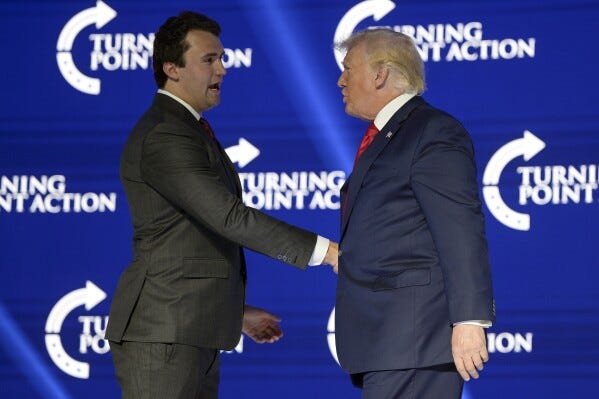The Rise of the Very Online Right
Trump's most reliable cheerleaders exist not in the American heartland, but on Twitter

The impetus of this essay comes from my displeasure at two recent books attempting to diagnose the Trump phenomenon. One is The Kingdom, the Power, and the Glory: American Evangelicals in an Age of Extremism by Tim Alberta, a staff writer for the Atlantic. The other is White Rural Rage: The Threat to American Democracy, co-authored by University of Maryland Professor Tom Schaller and journalist Paul Waldman. At best, both these books provide an inadequate portrayal of Trump’s viral appeal among Americans. And at worst, they risk fueling the ongoing Kulturkampf between the political left and right. For my part, I am uncertain that Evangelical Christianity and white rural dwellers, both having existed in the early days of the American Republic, is responsible for the novel phenomenon that is Trump’s political career. How did someone whose first Presidential candidacy in 2000 was a long-shot end up becoming a serious contender for the White House in the years 2016, 2020, and 2024?
The answer, I propose, can be found in a coterie of activists, commentators and politicos who have built their careers using online platforms such as YouTube and Twitter. Though not officially members of the Trump campaign or staff, these figures’ contributions are essential to the success and the enduring appeal of their preferred candidate.
As this essay was being written, one of the Very Online Right personalities, Candace Owens, was fired from the online conservative platform The Daily Wire. The main reason for her dismissal has to do with her views regarding the ongoing Israel-Gaza war, which put her in conflict with her boss, Daily Wire founder and editor emeritus Ben Shapiro. In the previous year, Shapiro was also embroiled in a conflict with another Daily Wire affiliate, Steven Crowder. The Canadian-born pundit, though offered a $50 million deal from Shapiro’s company, called it a “slave contract” and alleged that Shapiro and co. were “in bed with” tech companies. Later in 2023, Crowder also attracted controversy when, amidst his divorce, home video footage of him mistreating his wife surfaced online.
Owens, Crowder and Shapiro have all been of great import to the Trump movement. Other figures include - but not limited to - Charlie Kirk, Jesse Kelly, Dan Bongino, Jack Posobiec, Dave Rubin, and even Trump himself. Other figures, such as Joe Rogan, Elon Musk and Tulsi Gabbard, though not of the Right ideologically, can be counted as fellow travelers. Just as how AM radio have been the medium of choice for tech-savvy conservatives during the years of Reagan and Bush, the Internet have been the broadcasting tool for the online Trump supporters. Conservatives’ favorite punching bag have been the well-to-do elites from the coasts, who are seen as unattached to a locality. However, by using the Internet, the Very Online Right can broadcast their views from anywhere in the world. As a result, many of these figures have chosen to pack up and move to another state, without noticeable changes in their programming qualities. The Daily Wire, for example, famously uprooted from Los Angeles, California, to Nashville, Tennessee. Comedian Joe Rogan, host of the blockbuster Joe Rogan Experience podcast, also moved his operation from California to Austin, Texas. Dave Rubin, another popular right-wing podcast host, also joined the exodus from California, relocating to Florida during the governorship of Ron DeSantis.
The rise of Trump, of course, would be inexplicable without his online presence. It is not just his Twitter messages, but mass media’s constant rebroadcasting of his every thought that draws attention to his campaigns. Although mainstream media exists as the right’s other favorite punching bag, it is possible that if Trump’s campaign was only limited to Fox News and talk radio, he would not have been President. Because Americans tend to receive the news via social media, instead of the paper, the TV, or the radio, that the Trump phenomenon could take flight. Barack Obama may have been the first ‘social media president’, the Arab Spring may have started as a protest on social media, but Trump and his supporters have been unprecedented in realizing the potential for Twitter to sustain a massive campaign and disrupt politics as usual.
Conservatives are often stereotyped as old fogies who spend their days watching Fox News and playing backgammon, but since young people have the tech-savvy advantage, they are the key movers of the Online Right. As of this writing, for example, Turning Point CEO Charlie Kirk is 30 years old, Candace Owens is 34, Steven Crowder is 36, and Ben Shapiro is 40. The elderly, surprisingly, are some of their most hated political figures - Elizabeth Warren (74), Joe Biden (81), Bernie Sanders (82), Nancy Pelosi (84). The gap, therefore, is not just ideological - it is generational also.
Historically, mass politics have been inconceivable without mass media. Martin Luther would have been just another excommunicated heretic without the advent of the printing press. Charlies Coughlin would have been just another eccentric parochial cleric had it not been for the radio. And, as previously mentioned, Donald Trump would have been just another lunatic third-party candidate if it was not for the existence of Twitter. If one wish to take Trump’s political career seriously, including his current bid for the White House, go no further than online.





Every ideology needs its greenhouse. But the seed comes from outside.